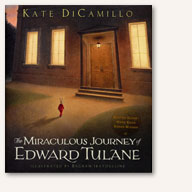In the comment section of Rebecca’s post on 40 Modern Nonfiction Books Everyone Should Read, she and Anna and I got into a discussion about the list of books she was reviewing. I said that I thought the list was dull. Most of the books on it are self-help or management books, which may be informative but aren’t particularly interesting or inspiring. (To me at least–maybe you find The 7 Habits of Highly Effective People riveting!) Of course, the guy who wrote that list didn’t call it the Most Exciting Nonfiction Books Everyone Should Read, but I like to think that if I were giving people a list of books they should read, those books would be entertaining as well as useful. I made a couple of suggestions along those lines in the comments, and was then challenged to write a post on it.
So I made a list of the eight books I think everyone should read–the eight that immediately jumped to mind as the ones that have most powerfully influenced how I live my life. As I said to Anna and Rebecca in the comments, these aren’t necessarily books that are going to help anyone get a job or buy a house or whatever, but they are the books that I find myself going back to again and again for advice on how to function in the world.
1) The Happiness Project by Gretchen Rubin
This is the book that has had the greatest impact on my day-to-day life. It’s half general ideas and research about happiness and half practical advice. The book is based on Rubin’s super-popular blog and in some ways the daily reinforcement of the blog is probably more powerful, but the book is very good. I have given stacks of these as gifts.
2) This is Water by David Foster Wallace
Wallace’s commencement speech at, I think, Kenyon College, used to be available out there on the internet, but then someone decided to publish it in book form and make people take down the free versions. But it’s well worth buying (and hard to begrudge his family the money). It presents a very kind, thoughtful, gentle way of moving through the world. Good advice for new graduates, good advice for those of us who graduated long, long ago.
3) Take the Cannoli by Sarah Vowell
I first heard Sarah Vowel on This American Life and of late she’s published a great string of books on American history, but my favorite work of hers is still these essays. There’s one, in particular, where she talks about how she doesn’t believe in God, but she does believe in all these other things, that I really love.
4) Tiny Beautiful Things by Cheryl Strayed
A newcomer to the list! This collection of Strayed’s Dear Sugar advice column for the Rumpus just came out, but it’s a powerful one. These aren’t your standard requests for advice and they’re not your standard responses. I read this in a restaurant, while I was out of town on a business trip, and it made me cry in public.
5) Paula Spencer by Roddy Doyle
The only fiction on the list, even though I wasn’t really thinking about that when I made the list. This is an odd sort of stream of consciousness story about an Irish woman who is, well, living her life. It’s about how she makes it through the day and tries to relate to her kids and tries to improve her lot. The style, and the Irish vocabulary, can be a bit challenging, but for me this reads like a handbook on how to find joy and satisfaction in everyday life.
6) The Spirit Catches You and You Fall Down by Anne Fadiman
The amazingly detailed, thoughtful story of a young Hmong girl with epilepsy and the challenges that meshing traditional Hmong beliefs with modern medicine created for the girl’s family and her doctors. This one story was the best explanation I have ever read of cross-cultural communication issues, and just in general shows how well-meaning people with the same goal can still have to work terribly hard to understand each other.
7) Operating Instructions by Anne Lamott
Lamott can be a little Jesus-y for me sometimes, but this journal of the first year of her son’s life, where she tells the story of being a scared single mom barely hanging on to sobriety and sanity, is a wonderful example of faith.
8) In Defense of Food by Michael Pollan
The politics of food and eating are so fraught and political I hate to even include this, but I did find it really useful, so it goes on the list. Michael Pollan can be awfully preachy and kind of oblivious to some of the baggage that food carries for many people, but this book presents an extremely straightforward, simple, actionable philosophy of how to eat. If you want something similar but with more of a narrative story and a call to action, you could also read Animal, Vegetable, Miracle by Barbara Kingsolver.
And an honorable mention, although I know I’ve mentioned it on the blog before, The Miraculous Journey of Edward Tulane. This is such a powerful, heart-breaking book that I think everyone should read it as a personal version of the psychopath test–if you can read this without crying, you should probably do something to address your lack of a soul.
